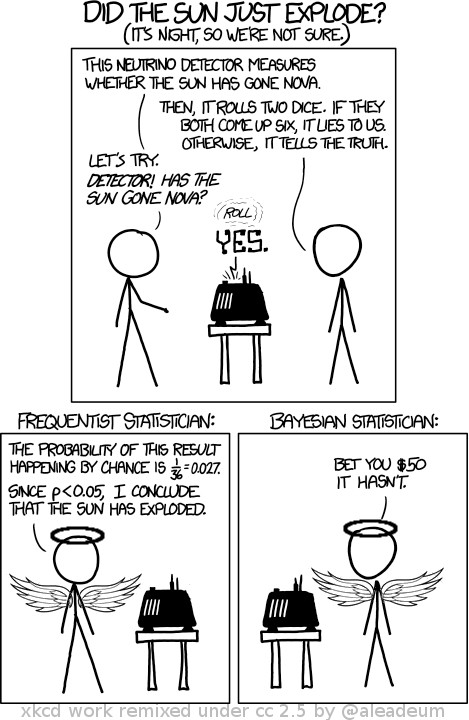Humor
On the certainty that God exists and why Bayesians should go π
Up to this day I defined my theological position as Agnostic, which is not saying much given the different interpretations and philosophical flavors we have to position ourselves when it comes to God. This is why sometimes I instead simply reply to The Question with something like “Both alternatives are equally crazy, so I don’t know.“ But, can we use statistics to better describe our position in these kind of philosophical matters, or even dictate how should we live our lives? Yes, we can.
WARNING: Beware agnostics!!! I will show mathematical arguments that might turn you into a full blown Believer or a hardcore Atheist… So if you keep reading don’t say I did not warn you.

If we envision probability as a measure linked to a random process then questions like “What is the probability that God exists?” imply a sort of Supra-God that creates universes with Gods with a frequency p. But then some might argue that this Supra-God is actually God so, at the end, these kind of philosophical questions make no statistical sense for such frequentist interpretation of probability.
Then we have those that interpret probability as a degree of belief on matters subject to uncertainty, this interpretation is the one hold by Bayesian Statistics.
So if I wear a Bayesian hat and I am asked The Question then, instead replying “I don’t know” to describe my ignorance I should reply with “50%” or “p=1/2“. This is so because when Bayesians (The Objective Kind) have no information on a problem they use a plethora of principles in a Groucho style fashion to figure out a prior distribution to kick off Bayes’ Theorem machinery.
But there are an infinite number of prior distributions with an expected value of 1/2 so, which among this infinite number describe better my agnosticism? Is there such thing as a unique agnostic prior to rule them all? Well, it seems this Holy Grail does not exist since we can read in highly commendable Bayesian books like Bernardo & Smith thing like:
In general we feel that it is sensible to choose a non-informative prior which expresses ignorance relative to information which can be supplied by a particular experiment. If the experiment is changed, then the expression of relative ignorance can be expected to change correspondingly. (Box and Tiao, 1973 p.46).
Wait, what? We change the experiment and our prior ignorance changes too? In fact not all Bayesians agree with their existence; (Howson 2002; O’Hagan 2006; Press 2003) they regard any Bayesian Objective “non-informative” priors simply as well formed beliefs… So I’ll pick on the Subjective kind interpretation and in this post I am going to well form my belief in God.
Plus, in the process of searching for my Agnostic prior I’ll discuss why Bayesians should measure their beliefs from 0 to π instead from 0 to 1; This later measure is too frequentist for them and π makes more mathematical sense since trigonometrical functions are going to naturally pop up everywhere in our prior belief endeavor. Continue reading

